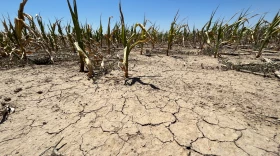-
From the Dakotas to Texas, wheat acres have been on the decline, due to higher temperatures, drought and farmers shifting to more profitable crops. New innovations could rejuvenate the state of wheat production.
-
At grassland sites worldwide, including the Midwest and Great Plains, scientists simulated extreme drought conditions. The study provides a far-reaching and systematic look at the effects of drought severity.
-
Several states, including Missouri, Illinois and Indiana, are in moderate to severe drought. Climatologists say it’s unlikely to let up soon.
-
Leaves typically start to peak in the Kansas City region by early October, but projecting peak foliage isn't an exact science. Here are some things you can do to get the most out of fall's colors.
-
Southwest Kansas residents are making an effort to remember a river that helped shape communities in the area. The Arkansas River today has run dry in the region, but has left a significant impact, leading locals looking for conservation and recharge efforts.
-
Kayakers are trying to clean up garbage from the Kansas River, but new trash keeps coming. Learn about the small nonprofit group determined to protect the waterway. Plus: Extreme drought in the Midwest and Great Plains is allowing a fungus that kills trees to flourish. How are forestry crews and experts adapting to rapidly changing tree canopies?
-
Years of drought conditions in the Midwest and Great Plains have opened the door for pests and diseases that are killing trees. Now people working in parks and forests are planting new species they hope can survive the changing conditions.
-
In western Kansas, rural hospitals have been closing or are perpetually understaffed, leaving residents to drive anywhere from an hour to multiple hours for doctors appointments. Plus: Scientists are working on a new framework that factors climate trends into how we think about drought.
-
The National Academies of Sciences, Engineering, and Medicine is developing a framework for assessing drought in a changing climate. It's a difficult task, as what's considered drought is often situational.
-
Missouri lawmakers are making it more difficult to take water out of the state without a permit, after raising concerns about drought and water scarcity in the west.
-
All six U.S. regional climate centers will remain online through a new contract deadline in mid-June. Four of the centers, which are overseen by the National Oceanic and Atmospheric Administration, were abruptly closed last week after their funding ran out.
-
The closure of four of the six Regional Climate Centers across the U.S. occurred after funding from the National Oceanic and Atmospheric Administration ran out. A recent report stated that the Trump administration plans to propose a 25% cut to NOAA's budget next fiscal year.
Play Live Radio
Next Up:
0:00
0:00
Available On Air Stations











